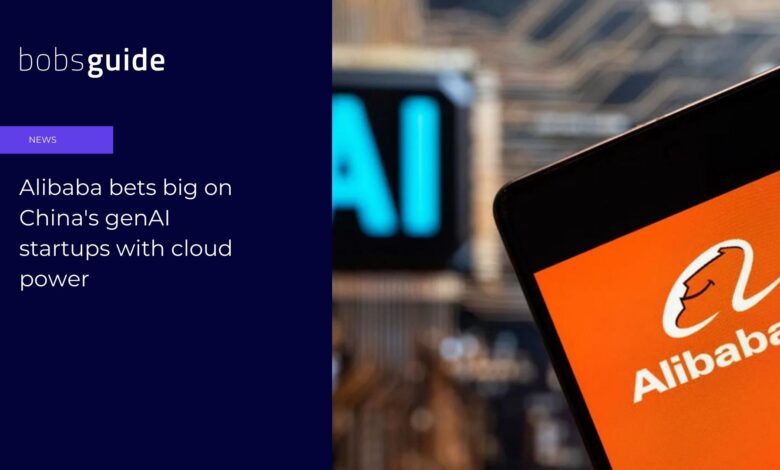Alibaba bets big on China’s genAI startups with cloud power

Alibaba invests in AI startups by offering cloud computing credits, leading a $1 billion round for Moonshot AI and aligning investments with its cloud business strategy.
Alibaba, the Chinese e-commerce titan, has taken a significant leap in the artificial intelligence (AI) domain by becoming a leading investor in China’s generative AI startups. This strategic move leverages Alibaba’s vast cloud computing infrastructure, offering a unique form of investment to burgeoning AI companies.
Alibaba’s approach to investment is trying to replicate the success of Microsoft’s investment in the US leader, OpenAI, by acquiring stakes in notable startups like Moonshot, Zhipu, MiniMax, and 01.ai. These startups are focused on developing local alternatives to popular US applications, mirroring innovations like OpenAI’s ChatGPT and Character.ai’s avatar chatbot.
Instead of traditional cash-for-equity funding, Alibaba provides AI startups with credits to access the network resources essential for training AI models. This method is particularly valuable in China, where network resources are scarce due to US restrictions on advanced chip exports.
A prime example of Alibaba’s investment strategy is the $1 billion funding round for Moonshot AI, a leading generative AI startup. Alibaba led the round, which included other tech giants like Microsoft and Tencent. Remarkably, nearly half of the investment came in the form of cloud computing credits. This funding has skyrocketed Moonshot AI’s valuation to $2.5 billion, an eightfold increase within a year.
Alibaba’s cloud and AI synergy
Alibaba’s investment in AI startups is a strategic alignment with its cloud business. Joseph Tsai, an Alibaba executive, revealed that half of China’s top generative AI enterprises utilise Alibaba’s cloud infrastructure. This synergy is crucial as Alibaba seeks to reinvent itself as an AI innovator amid a two-year economic downturn.
Over the past year, Alibaba’s chief executive Eddie Yongming Wu has personally directed investments in the four foremost AI start-ups. This move comes as Alibaba endeavours to redefine itself as a pioneer in AI innovation.
This surge in AI investment arrives at a critical juncture for Alibaba. The company is navigating heightened competition from ByteDance and PDD Holdings in its core e-commerce sector. Additionally, it grapples with the aftermath of its ambitious restructuring plan, during which its cloud business was slated for an initial public offering.
Alibaba scrapped the IPO plan in November, citing the repercussions of US chip restrictions. Wu subsequently assumed direct control of the cloud business, vowing to Alibaba investment in AI and positioning the business at the forefront of his strategy to drive growth.
Since 2022, the cloud division had been experiencing single-digit quarterly growth following Beijing’s crackdown on major internet companies. Its profitability significantly trailed behind that of US counterparts like AWS.
Charlie Dai, vice-president and principal analyst at tech consultancy Forrester, stated that Alibaba was “facilitating the start-ups by offering a public cloud platform with comprehensive capabilities boosted by its broad ecosystem for their open-source models,” all the while generating new revenue for its cloud business by furnishing computing resources to train their models.
Alibaba’s investment structure in Moonshot bears resemblance to those of Microsoft and Amazon, whereby cash is funnelled into AI start-ups under the condition that they utilise the funds to train and operate models on Azure and AWS servers, respectively.
The future of AI investment in China
In China, computing-for-equity offers hold more appeal, given the scarcity of cloud resources due to US restrictions on advanced chip exports. “Providing compute is actually more valuable than cash,” noted a Chinese AI scientist. “With the shortage of semiconductors, it’s very hard to get access to a 10,000 GPU [processing] cluster, which Alibaba has.”
Meanwhile, social media group Xiaohongshu is pursuing an even more innovative investment approach. It is offering increased traffic for the start-ups’ products through promotions on its popular Instagram-like platform in exchange for equity.
China’s major internet firms, including Alibaba, Meituan, Xiaohongshu, and Tencent, are playing a significant role in financing this wave of start-ups compared to the previous cohort dominated by surveillance companies SenseTime and Megvii.
Beijing-Washington relations and a downturn in China’s VC industry have made today’s AI start-ups more reliant on financing from domestic internet companies. Consequently, they possess less bargaining power in determining cloud service prices.



